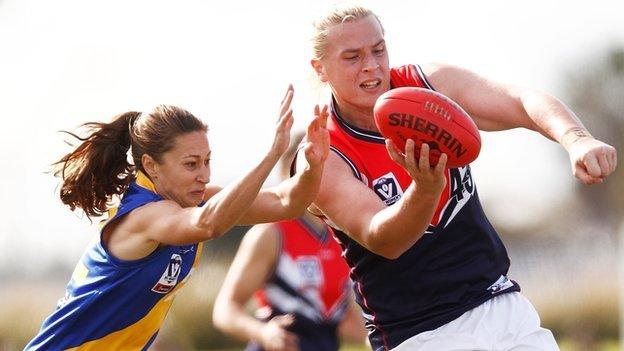Mississippi bans trans girls from girls' school sports
- Published

Mississippi Republican Governor Tate Reeves
Mississippi's governor has signed a law banning transgender athletes from competing in girls' sports at school.
Activists say the "Mississippi Fairness Act" is the first law targeting transgender people to pass in 2021.
The bill argues that boys and girls have "inherently different athletic capabilities". It is expected to face legal challenges.
It comes as a swath of Republican states push back against pro-LGBT measures from the Biden administration.
What does the law say?
The law requires public high schools and institutions of higher education to "designate its athletic teams or sports according to biological sex".
Coming into effect in July, it also calls for protecting schools that maintain separate sports teams from complaint or investigation.
Supporters of the bill had argued that transgender women have an unfair advantage over those born female, because they have "categorically different strength, speed and endurance".
It cites an article written by a trio of women's sports stars - including tennis champion Martina Navratilova - that said it would be "a denial of science" to ignore that those born male can "beat the best girls and women in head-to-head competition".
Ms Navratilova has since established a group that she says will seek a "science-based, ethical approach" to "establish a middle ground that both protects girls' and women's sport and accommodates transgender athletes". She has also proposed a special provision for elite sports.
How much support did the bill have?
The bill passed through both chambers of the state legislature by overwhelming majorities, the House by 81-28 and the Senate 34-9.
Its sponsor, Republican senator Angela Burks Hill, said she introduced the legislation after seeing issues arise in other parts of the country.
Opponents of transgender women athletes competing in accordance with their gender identity frequently cite a lawsuit filed against two trans females who were champion sprinters in Connecticut.
Ms Hill did not identify any similar local concerns but said "numerous coaches across the state" called to say pre-emptive action was needed.
Critics say that examples of transgender girls outcompeting other girls are rare, which is why the Connecticut case is so frequently cited.
What has the reaction been?
Critics of the new law argue that it is dangerous and discriminatory because it directly targets transgender children.
The Human Rights Campaign (HRC), the largest LGBT advocacy group in the US, warned that bill will lead to increased bullying for transgender pupils.
"This law is a solution in search of a problem, and legislators in Mississippi have not provided any examples of Mississippi transgender athletes gaming the system for a competitive advantage because none exist," the organisation's president, Alphonso David, said on Thursday.
Trans rights activist Chase Strangio, from the American Civil Liberties Union (ACLU) called the bill "very vague and seemingly unenforceable".
"Unfortunately, there is already rampant discrimination against trans youth in Mississippi, which means people are already driven out of sport," he said.
Will other states follow suit?
At least 20 different states are considering measures that critics say will stymie equality for transgender Americans.
According to HRC, around 73 of the 147 anti-LGBT bills being considered around the country affect trans people.
About half of those 73 bill under consideration call for a ban on trans girls in women's sports, much like the Mississippi law.
It comes as pro-equality measures have gained momentum on the national level.
On his first day in office, President Joe Biden signed an executive order aimed at preventing discrimination on the basis of sexual orientation or gender identity.
Allow X content?
This article contains content provided by X. We ask for your permission before anything is loaded, as they may be using cookies and other technologies. You may want to read X’s cookie policy, external and privacy policy, external before accepting. To view this content choose ‘accept and continue’.

Allow X content?
This article contains content provided by X. We ask for your permission before anything is loaded, as they may be using cookies and other technologies. You may want to read X’s cookie policy, external and privacy policy, external before accepting. To view this content choose ‘accept and continue’.

Concern by some that Mr Biden's order would allow trans women to play women's sports sparked the social media hashtag #BidenErasedWomen.
Mississippi Governor Tate Reeves blamed Mr Biden's order for forcing the state to pass legislation.
"But for the fact that President Biden as one of his first initiatives sat down and signed an executive order - which, in my opinion, encourages transgenderism amongst our young people - but for that fact, we wouldn't be here today," he said at the Mississippi capitol on Thursday.
In an attempt to make Mr Biden's executive action more permanent, the US House passed the Equality Act - considered the most pro-LGBT bill in US history.
According to the ACLU, the Equality Act would not introduce new rights for transgender students, including those who wish to participate in school sports.
Related topics
- Attribution
- Published26 June 2019

- Attribution
- Published17 April 2020

- Attribution
- Published18 December 2018
